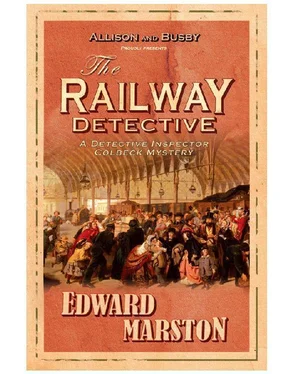Edward Marston - The Railway Detective
Здесь есть возможность читать онлайн «Edward Marston - The Railway Detective» весь текст электронной книги совершенно бесплатно (целиком полную версию без сокращений). В некоторых случаях можно слушать аудио, скачать через торрент в формате fb2 и присутствует краткое содержание. Жанр: Классический детектив, Исторический детектив, на английском языке. Описание произведения, (предисловие) а так же отзывы посетителей доступны на портале библиотеки ЛибКат.
- Название:The Railway Detective
- Автор:
- Жанр:
- Год:неизвестен
- ISBN:нет данных
- Рейтинг книги:4 / 5. Голосов: 1
-
Избранное:Добавить в избранное
- Отзывы:
-
Ваша оценка:
- 80
- 1
- 2
- 3
- 4
- 5
The Railway Detective: краткое содержание, описание и аннотация
Предлагаем к чтению аннотацию, описание, краткое содержание или предисловие (зависит от того, что написал сам автор книги «The Railway Detective»). Если вы не нашли необходимую информацию о книге — напишите в комментариях, мы постараемся отыскать её.
The Railway Detective — читать онлайн бесплатно полную книгу (весь текст) целиком
Ниже представлен текст книги, разбитый по страницам. Система сохранения места последней прочитанной страницы, позволяет с удобством читать онлайн бесплатно книгу «The Railway Detective», без необходимости каждый раз заново искать на чём Вы остановились. Поставьте закладку, и сможете в любой момент перейти на страницу, на которой закончили чтение.
Интервал:
Закладка:
Robert Colbeck was mentioned as being in charge of the case and he was surprised to read a quotation from Superintendent Tallis, who referred to him as ‘an experienced, reliable and gifted detective’. When he remembered some of the less flattering things that his superior had called him in private, he gave a wry smile. One point made by both newspapers was incontrovertible. No crime of this nature had ever before confronted a Detective Department that, formed only nine years earlier, was still very much in its infancy. They were in uncharted waters.
While the newspapers used this fact as a stick with which to beat the men at Scotland Yard, the Inspector in charge of the investigation saw it as a welcome challenge. He was thrilled by the notion of pitting himself against a man who had organised a crime of such magnitude and audacity. Most of the offenders he had arrested were poor, downtrodden, uneducated men who had turned to crime because there was no honest way for them to make a living. London had its share of seasoned villains, desperate characters who would stop at nothing to achieve their ends, but the majority who trooped through the courts were pathetic figures for whom Colbeck felt a sneaking sympathy.
This time, however, it was different. They were up against a man of clear intelligence, a natural leader who could train and control a gang of almost a dozen accomplices. Instead of fearing him, as the reporters were inclined to do, Colbeck saw him as a worthy adversary, someone who would test his skills of detection and who would stretch the resources of Scotland Yard in a way that had never occurred before. Solving the crime would be an adventure for the mind. However long it might take, Colbeck looked forward to meeting the man behind the train robbery.
Meanwhile, he decided to catch up on some lost sleep. The train was moving along at a comfortable speed but there were stops to make and it would be hours before it reached Birmingham. He settled back in his upholstered seat and closed his eyes. It was a noisy journey. The chugging of the locomotive combined with the rattling of the carriages and the clicking of the wheels on the rails to produce a cacophony that tried to defy slumber. There was also a lurching motion to contend with as the train powered its way along the standard gauge track.
Because it offered more stability, Colbeck preferred the wider gauge of the Great Western Railway and the greater space in its carriages but he had no choice in the matter on this occasion. The company whose mail train had been robbed was the one taking him to Birmingham, and he was interested to see how it treated its passengers. His compartment was almost full and sleep would offer him a refuge from conversation with any of his companions. Two of them, both elderly men, were scandalised by what they had read in their newspapers.
‘A train robbery!’ protested one of them. ‘It’s unthinkable.’
‘I agree,’ said the other. ‘If this kind of thing is allowed to go on, we’ll all be in danger. Any passenger train would run the risk of being ambushed and we would be forced to hand over everything we are carrying of value.’
‘What a ghastly prospect!’
‘It might come to that.’
‘Not if this gang is caught, convicted and sent to prison.’
‘What chance is there of that?’ said the other, sceptically.
‘Detectives have already begun an investigation.’
‘I find it hard to put much faith in them, sir.’
‘Why?’
‘Because they have almost no clues to help them. According to the Times , these devils came out of nowhere, stole what they wanted, then vanished into thin air. The detectives are chasing phantoms.’
‘Yet they claim that this Inspector Colbeck is a gifted policeman.’
‘It will need more than a gifted policeman to solve this crime.’
‘I agree with you there, my friend.’
‘My guess is that this Inspector will not even know where to start.’
On that vote of confidence in his ability, Colbeck fell asleep.
The Devil’s Acre was almost as menacing by day as by night. Danger lurked everywhere in its narrow streets, its twisting lanes and its dark alleyways. There was a pervading stink that never seemed to go away and an unrelenting clamour. Bawling adults and screaming children joined in a mass choir whose repertory consisted solely of a sustained and discordant din that assaulted the eardrums. Scavenging dogs and fighting tomcats added their own descant. Smoke-blackened tenements were built around small, shadowed courtyards, thick with assorted refuse and animal excrement. In every sense, it was a most unhealthy place to live.
Brendan Mulryne, however, loved the district. Indeed, he was sad that parts of it had recently been pulled down during the building of Victoria Street, thereby limiting its size and increasing the population of the area that was left, as those who had been evicted moved into houses that were already crowded with occupants. What the Irishman enjoyed about the Devil’s Acre was its raucous life and its sense of freedom. It was a private place, set apart from the rest of London, a swirling underworld that offered sanctuary to criminals of every kind in its brothels, its tenements, its opium dens, its gambling haunts and its seedy public houses.
Mulryne felt at home. People he had once hounded as a policeman were now his neighbours and he tolerated their misdemeanours with ease. It was only when a defenceless woman was being beaten, or when a child was in distress, that he felt obliged to intervene. Otherwise, he let the mayhem continue unabated. It was his natural milieu. Unlike strangers who came into the Acre, he could walk its streets without fear of assault or of attracting any of the pickpockets who cruised up and down in search of targets. Mulryne’s size and strength bought him respect from almost everyone.
Isadore Vout was the exception to the rule. When the Irishman found him that morning, the moneylender was at his lodging, enjoying a breakfast of stale bread and dripping that he first dipped into a mug of black, brackish tea. Rich by comparison with most people in the area, Vout led a miserly existence, wearing tattered clothes and eating poor food. He was a short, skinny weasel of a man in his fifties, with long grey hair that reached his shoulders and a mean face that was forever set in an expression of distaste. He was not pleased when the landlady showed in his visitor. His voice betrayed no hint of respect.
‘Wor d’yer want, Mulryne?’ he said through a mouthful of food.
‘First of all,’ replied the other, standing over him, ‘I’d like a little politeness from that arsehole you call a mouth. Unless, that is, you’d like me to pour the rest of that tea over your head.’
‘Yer got no right to threaten me.’
‘I’m giving you friendly advice.’ Pulling up a stool, Mulryne sat beside him at the table and saw what he was eating. ‘Bread and dripping, is it?’ he noted with disgust. ‘And you, able to dine off the finest plate and eat like a lord.’
‘It’s been a bad month, ain’t it?’
‘You never have a bad month, you leech. There’s always plenty of blood for you to suck out of people who can’t afford to lose it. That’s why I’m here, Isadore. I want to talk about debts.’
Vout was surprised. ‘Yer want to borrow money?’
‘I wouldn’t borrow a penny from a creeping Shylock like you.’
‘Yer’d get a good rate of interest, Mulryne.’ He nudged his visitor. ‘Friends of mine have special terms, see?’
‘I’m no friend of yours, you old skinflint. Special terms?’ repeated Mulryne with derision. ‘I don’t give a fiddler’s fart for your special terms.’
‘Then why are yer botherin’ me?’
‘Because I need information from you. There’s a man who probably turned to you for a loan — God help him! I want to know where he is.’
Читать дальшеИнтервал:
Закладка:
Похожие книги на «The Railway Detective»
Представляем Вашему вниманию похожие книги на «The Railway Detective» списком для выбора. Мы отобрали схожую по названию и смыслу литературу в надежде предоставить читателям больше вариантов отыскать новые, интересные, ещё непрочитанные произведения.
Обсуждение, отзывы о книге «The Railway Detective» и просто собственные мнения читателей. Оставьте ваши комментарии, напишите, что Вы думаете о произведении, его смысле или главных героях. Укажите что конкретно понравилось, а что нет, и почему Вы так считаете.












